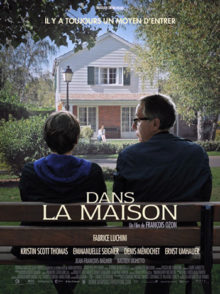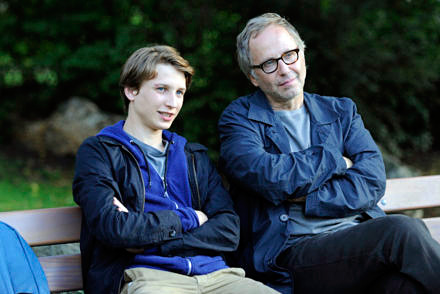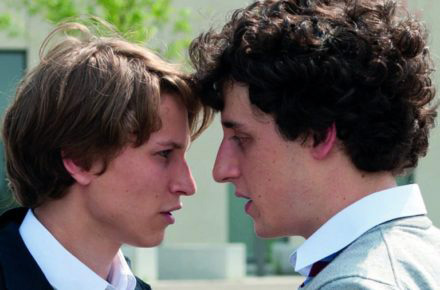 In the House
In the House
Dans la maison
Written and Directed by François Ozon
from the play by Juan Mayorga
Premiered September 10, 2012, at the Toronto International Film Festival
Drama/Comedy (foreign)
105 min.
Review by Stephen O. Murray
October 25, 2017.
Adapted by prolific gay French auteur François Ozon from a play by Juan Mayorga, In the House (Dans la maison, 2012) is a Pirandellian dark comedy about writing, invasion of privacy, expropriation and manipulation of the lives of others.
 A failed writer turned teacher, Germain Germain [Fabrice Luchini] is surprised and delighted to find a boy with talent in his literature class, Claude Garcia [Ernst Umhauer].
A failed writer turned teacher, Germain Germain [Fabrice Luchini] is surprised and delighted to find a boy with talent in his literature class, Claude Garcia [Ernst Umhauer].
Even what Claude writes for the first assignment is unsettling in subject matter: chronicling his success at getting into the house of what seems to Claude (whose mother long ago left his crippled father) a normal family. Claude is helping Rapha Artole (fils—the son) with trigonometry problems, while spying on the mother, Esther Artole [Roman Polanski’s wife and lead in his Venus in Furs, Emmanuelle Seigner] and, to a lesser extent the father, hearty Rapha Artole père [Denis Ménochet].
Claude’s serial stories entrance while troubling both his teacher and the teacher’s wife Jeanne Germain [Kristin Scott Thomas, who not only speaks perfect French but has the look and body language down]. The teacher advocates Flaubertian detachment, though the unfolding story is about forming or counterfeiting attachment (from all three Garcias). Even more than her husband, Jeanne assumes that everything Claude writes is reportage of what he does and sees.
There are scenes in which Germain scolds Claude within the scenes Claude is writing. Germain presses Claude to find an ending that is unexpected yet after being read feels both satisfying and inevitable. This sets a high demand on the screenplay, and the ending was anticlimactic. Still, I found the movie more interesting and less repellent than some other Ozon movies (See the Sea, Criminal Lovers, Water Drops on Burning Rocks), though not as good as some others (5×2, 8 Women, Time to Leave), in the league with Ozon’s previous (2010) Potiche (in which Luchini played a major part).
 In addition to uncertainty about what is fictional in what Claude writes about his embeddedness (eventually literal) in the Artole house, the viewer cannot be certain what the Germains are reading into the installments they both read and discuss, with Mme. Germain judging the characters while her husband attempts to hold onto judging the writing.
In addition to uncertainty about what is fictional in what Claude writes about his embeddedness (eventually literal) in the Artole house, the viewer cannot be certain what the Germains are reading into the installments they both read and discuss, with Mme. Germain judging the characters while her husband attempts to hold onto judging the writing.
Besides being Rapha’s math tutor, Claude also helps Rapha write an attack on Germain for humiliating Rapha in class (making him read his essay about his best friend, Claude, and then tearing it apart, sentence by sentence). And to ensure Claude’s success in raising Rapha’s math grade, Germain has stolen a math exam and supplied it to Claude.
Yes, Claude has bewitched two households and eventually gets into the apartment of the Germains, where he is not surprised that Jeanne knows the story he has been writing for her husband. Or that she has been disturbed by her husband’s fascination with the sixteen year-old boy, even as she also hangs on the cliff of expectation while waiting for the next installment of his serial (all of which end with “to be continued”).
The other voyeur, the viewer of the movie, does not know if the movie s/he is watching is going to veer into thriller violence or remain a bitter comedy (both Germain Germain and Claude are bitter as well as being aspiring and once-aspiring writers). Teacher tells student he must have more conflict to make an interesting story and then (along with the viewer) wonders how much of the conflict that then occurs in the serial is reportage, how much imagination. That is, how much is writing, how much living the story Claude is telling?
The Blu-Ray has an hour making-of feature and twelve minutes of deleted scenes, a poster gallery, and a trailer.
©2017 by Stephen O. Murray

